
"Folsom Prison Blues" is a song by American singer-songwriter Johnny Cash, based on material composed by Gordon Jenkins. Written in 1953, it was first recorded and released as a single in 1955, and later included on his debut studio album Johnny Cash with His Hot and Blue Guitar! (1957), as the album's eleventh track. The song combines elements from two popular folk styles, the train song and the prison song, both of which Cash continued to use for the rest of his career. It was one of Cash's signature songs. Additionally, this recording was included on the compilation album All Aboard the Blue Train (1962). In June 2014, Rolling Stone ranked it No. 51 on its list of the 100 greatest country songs of all time.

Johnny Cash at San Quentin is the 31st overall album and second live album by American singer-songwriter Johnny Cash, recorded live at San Quentin State Prison on February 24, 1969, and released on June 16 of that same year. The concert was filmed by Granada Television, produced and directed by Michael Darlow. The album was the second in Cash's conceptual series of live prison albums that also included At Folsom Prison (1968), På Österåker (1973), and A Concert Behind Prison Walls (1976).
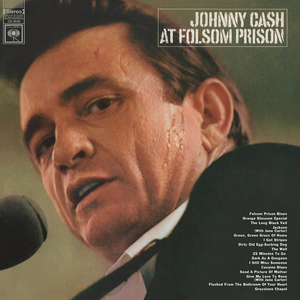
Johnny Cash at Folsom Prison is the first live album by American singer-songwriter Johnny Cash, released on Columbia Records on May 6, 1968. After his 1955 song "Folsom Prison Blues", Cash had been interested in recording a performance at a prison. His idea was put on hold until 1967, when personnel changes at Columbia Records put Bob Johnston in charge of producing Cash's material. Cash had recently controlled his drug abuse problems, and was looking to turn his career around after several years of limited commercial success. Backed by June Carter, Carl Perkins, and the Tennessee Three, Cash performed two shows at Folsom State Prison in California on January 13, 1968. The initial release of the album consists of fifteen songs from the first show and two from the second.

Class of '55: Memphis Rock & Roll Homecoming is a collaborative studio album by Roy Orbison, Johnny Cash, Jerry Lee Lewis, and Carl Perkins. It was released on May 26, 1986, by America/Smash Records, a subsidiary of Polygram Records. The album was produced by Chips Moman.
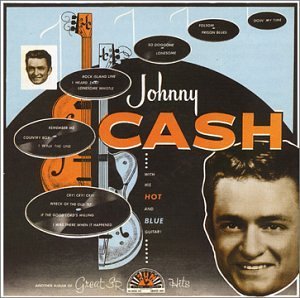
Johnny Cash with His Hot and Blue Guitar! is the debut studio album by American singer Johnny Cash, released on October 11, 1957. The album contained four of his hit singles: "I Walk the Line," "Cry! Cry! Cry!," "So Doggone Lonesome," and "Folsom Prison Blues." It was re-issued on July 23, 2002, as an expanded edition, under the label Varèse Vintage, containing five bonus tracks, three being alternate versions of tracks already on the original LP. In 2012, Columbia Records reissued the album with 16 additional non-album Sun Records tracks as part of its 63-disc Johnny Cash: The Complete Columbia Album Collection box set. In 2017, 60 years after the original release, the album was remastered under the title Johnny Cash with His Hot and Blue Guitar! . In 2022, Sun released a remastered edition of the original studio album, with only the original track listing. The songs had been remastered as to simulate being in the studio as the tracks were recorded.
"I Got a Woman" is a song co-written and recorded by American R&B and soul musician Ray Charles. Atlantic Records released the song as a single in December 1954, with "Come Back Baby" as the B-side. Both songs later appeared on the 1957 album Ray Charles.
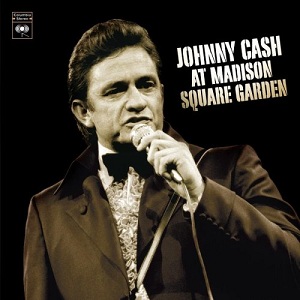
Johnny Cash at Madison Square Garden is a 1969 recording of a Johnny Cash concert at Madison Square Garden. It was released in 2002.
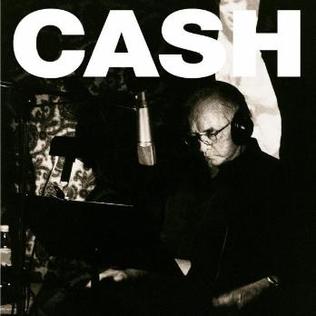
American V: A Hundred Highways is a posthumously released studio album by Johnny Cash. It was released on July 4, 2006, by American Recordings. As the title implies, it is the fifth entry in Cash's American series. Like its predecessors, the album is produced by Rick Rubin. It was Cash's first No. 1 album in 37 years. It was certified Gold on August 18, 2006, by the RIAA.

Highwayman 2 is the second studio album released by American country supergroup The Highwaymen. This album was released in 1990 on the Columbia Records label. Johnny Cash had left Columbia several years earlier, making this a "homecoming", and ultimately his final work for Columbia as the next Highwaymen album would be issued on another label.

Johnny Cash Sings the Ballads of the True West is a concept double album and the 22nd overall album released by country singer Johnny Cash, released on Columbia Records in 1965. Covering twenty individual songs, the album, as its title suggests, contains various ballads and other songs on topics related to the history of the American Old West. This includes Carl Perkins' "The Ballad of Boot Hill", "Streets of Laredo", and the sole single from the album, "Mr. Garfield", describing the shock of the population after the assassination of President James Garfield. One of the songs, "25 Minutes to Go", would later be performed at Folsom Prison and appear on Cash's famous At Folsom Prison recording in 1968, while the melody of "Streets of Laredo" would be recycled for the song "The Walls of a Prison" featured on Cash's album From Sea to Shining Sea.
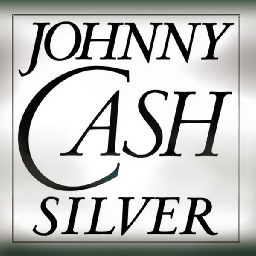
Silver is the 25th anniversary studio album by American country singer Johnny Cash, released on Columbia Records in 1979. It peaked at #28 on the Billboard albums chart. "(Ghost) Riders in the Sky" peaked at #2 on the singles chart; the two other singles, "Bull Rider" and "I'll Say It's True", had reached #66 and #42, respectively. Recordings of "Cocaine Blues" had previously appeared on At Folsom Prison and Now, There Was a Song!, under the title "Transfusion Blues" on the latter. The album was produced by Brian Ahern, who controversially introduced digital elements into the songs to the disapproval of some listeners. This is the last album that featured bassist Marshall Grant, longtime Cash collaborator in Tennessee Two. He departed from Cash's band the following year.

Johnny Cash på Österåker is a live album by country singer Johnny Cash released on Columbia Records in 1973, making it his 43rd overall release. The album features Cash's concert at the Österåker Prison in Sweden held on October 3, 1972. Its counterparts in concept are the more notable At Folsom Prison (1968), At San Quentin (1969), and A Concert Behind Prison Walls (1976). Unlike aforementioned, På Österåker does not contain any of Cash's most well-known songs; it does, however, include a version of Kris Kristofferson's "Me and Bobby McGee". "Orleans Parish Prison" was released as a single, faring rather poorly on the charts. Cash had previously recorded "I Saw a Man" for his 1959 album, Hymns by Johnny Cash.

Black on Black is a studio album by American country music artist Waylon Jennings, released on RCA Victor in 1982.
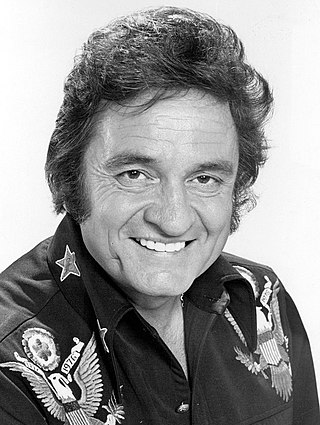
John R. Cash was an American singer-songwriter. Most of Cash's music contains themes of sorrow, moral tribulation, and redemption, especially songs from the later stages of his career. He was known for his deep, calm, bass-baritone voice, the distinctive sound of his backing band, the Tennessee Three, that was characterized by its train-like chugging guitar rhythms, a rebelliousness coupled with an increasingly somber and humble demeanor, and his free prison concerts. Cash wore a trademark all-black stage wardrobe, which earned him the nickname "Man in Black".
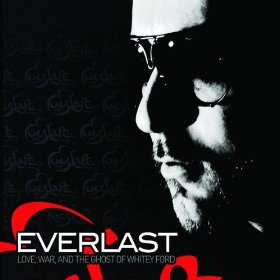
Love, War and the Ghost of Whitey Ford is the fifth solo studio album by American recording artist Everlast. It was released on September 23, 2008 via his own record label Martyr Inc, with distribution by Hickory Records/Sony/ATV Music Publishing. This album sees Everlast moving away from hip hop in favor of alternative rock and blues. The album peaked at number 15 on the Swiss music charts, number 61 in Germany, number 78 on the U.S. Billboard 200, and number 132 in France.
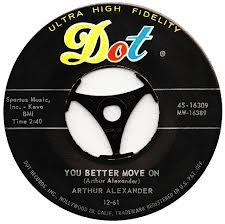
"You Better Move On" is a 1961 rhythm and blues song by Arthur Alexander. It reached number 24 on the Billboard Hot 100 in March 1962. Versions by Billy "Crash" Craddock, George Jones and Johnny Paycheck were hits on the Country charts.

Mama Tried is the seventh studio album by American country music singer and songwriter Merle Haggard and The Strangers, released on Capitol Records in 1968. It reached number 4 on Billboard's country albums chart. The title song was one of Haggard's biggest hit singles and won the Grammy Hall of Fame Award in 1999.

Killer Country is a studio album by Jerry Lee Lewis, released on Elektra Records in 1980. The album peaked at No. 35 on Billboard's Top Country Albums chart.
"Give My Love to Rose" is a country song by Johnny Cash, recorded at Sun Records in 1957. Cash sang and played it with the Tennessee Two, with Sam Phillips producing. It was released in August 1957 as the B-side of the single "Home of the Blues", which reached No. 5 in the Country & Western Chart. "Give My Love To Rose" reached No. 13 in the same chart.
"Rosanna's Going Wild" is a song written by June, Helen and Anita Carter for Johnny Cash.

















